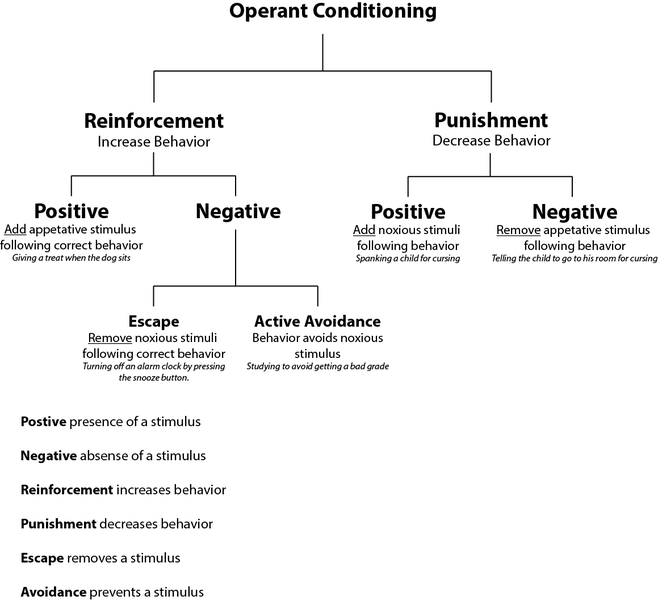Your What is the cognitive behavioral theory of panic disorder images are available. What is the cognitive behavioral theory of panic disorder are a topic that is being searched for and liked by netizens now. You can Get the What is the cognitive behavioral theory of panic disorder files here. Download all free photos.
If you’re searching for what is the cognitive behavioral theory of panic disorder images information connected with to the what is the cognitive behavioral theory of panic disorder keyword, you have come to the ideal blog. Our website always provides you with hints for seeing the maximum quality video and image content, please kindly surf and find more informative video content and images that match your interests.
What Is The Cognitive Behavioral Theory Of Panic Disorder. A definition of panic disorder is that it involves recurrent unexpected panic attacks where the sufferer between attacks still lives in fear of another one happening. CBT for panic disorder typically involves education about the nature and physiology of the panic response cognitive therapy techniques designed to modify catastrophic misinterpretations of panic symptoms and their consequences and graduated exposure to panic-related body sensations ie interoceptive exposure and avoided situations. Same cognitive affective and behavioral responses associated with the origi-nal trauma. Another effective psychotherapyoften considered to be the most popular type of therapy for anxiety disorders is cognitive-behavioral therapy CBT.
 Common Questions About Cognitive Behavior Therapy For Psychiatric Disorders American Family Physician From aafp.org
Common Questions About Cognitive Behavior Therapy For Psychiatric Disorders American Family Physician From aafp.org
Cognitive-Behavioral Treatment Combined With Asthma Education for Adults With Asthma and Coexisting Panic Disorder. Finally the clients are taught that small changes lead to life changes. Panic-focused psychodynamic psychotherapy PFPP is one such option thats been shown to be effective in treating panic disorder. Moreover compared to panicking patients panic-free patients had reduced their cognitive threat bias at post-treatment and follow-up to a significantly larger extent. The aim of this study was to study the efficacy of Cognitive Behavioral Intervention CBI in patients with panic disorder. Decades of research have demonstrated that cognitive behavior therapy CBT is an effective treatment for panic disorder with and without agoraphobia PD Craske Barlow 2013.
Panic attacks are sudden episodes of intense fear or anxiety of a rapid escalation normally present somatic and cognitive symptoms such as palpitations sweating sudden tremor feeling of choking chest pain nausea and fear of dying or.
Given the limitations of cognitive-behavioral therapy for panic and agoraphobia therapists should consider extending exposure to the underlying causes and dynamics of panic disorder 51. When properly implemented cognitive behavior therapy focuses on positive behavioral changes which will reinforce coping strategies ensuring success for client living with panic attacks. Likewise what might be a cognitive distortion that a person who has panic disorder experiences. Millions of people are affected by panic attacks. Another effective psychotherapyoften considered to be the most popular type of therapy for anxiety disorders is cognitive-behavioral therapy CBT. The specific objectives were to study the efficacy of CBI in reducing symptom severity cognitions and panic-related behaviors among individuals with panic disorder.
 Source: semanticscholar.org
Source: semanticscholar.org
Cognitive behavioral therapy CBT is a form of psychological treatment that has been demonstrated to be effective for a range of problems including depression anxiety disorders alcohol and drug use problems marital problems eating disorders and severe mental illness. A large amount of research has accumulated on the efficacy and effectiveness of cognitive-behavioral therapy CBT for anxiety disorders including posttraumatic stress disorder obsessive-compulsive disorder panic disorder generalized anxiety disorder social anxiety disorder and specific phobia. Cognitive-Behavioral Treatment Combined With Asthma Education for Adults With Asthma and Coexisting Panic Disorder. Cognitive behavioral therapies CBTs have been shown to be efficacious for the treatment of anxiety disorders in children and adolescents. Numerous research studies suggest that CBT leads to significant improvement in functioning.
 Source: quirurgica.com
Source: quirurgica.com
A logical extension of this was the development of cognitive models of panic disorder. Cognitive Models of Panic Disorder. Cognitive Models of Panic Disorder. The aim of this study was to study the efficacy of Cognitive Behavioral Intervention CBI in patients with panic disorder. Decades of research have demonstrated that cognitive behavior therapy CBT is an effective treatment for panic disorder with and without agoraphobia PD Craske Barlow 2013.
 Source: quirurgica.com
Source: quirurgica.com
Randomized clinical trials indicate that approximately two-thirds of children treated with CBT will be. Another effective psychotherapyoften considered to be the most popular type of therapy for anxiety disorders is cognitive-behavioral therapy CBT. Eye movement desensitization and reprocessing EMDR therapy is. David Clark 1986 and Aaron Beck 1989 view panic attacks as a catastrophic misinterpretation of harmless bodily sensations. A cognitive behavioral approach to panic disorder.
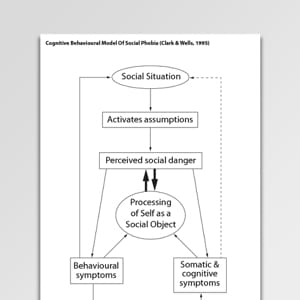 Source: psychologytools.com
Source: psychologytools.com
Likewise what might be a cognitive distortion that a person who has panic disorder experiences. Clarks elegantly simple model of panic owes much to the ideas of Beck eg 1976 which are discussed in detail in Chapter 4. Panic attacks are characterized by increased heart rate. David Clark 1986 and Aaron Beck 1989 view panic attacks as a catastrophic misinterpretation of harmless bodily sensations. Clarks cognitive model of panic.
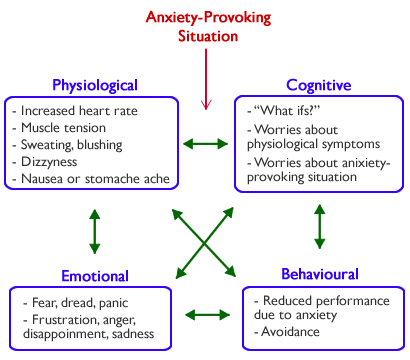 Source: guelphtherapist.ca
Source: guelphtherapist.ca
David Clark 1986 and Aaron Beck 1989 view panic attacks as a catastrophic misinterpretation of harmless bodily sensations. In this article I wish to describe briefly the cognitive behavioural theory of panic disorder one of the most evidence based models and to provide. What is the cognitive behavioral theory of panic disorder. A logical extension of this was the development of cognitive models of panic disorder. Numerous research studies suggest that CBT leads to significant improvement in functioning.
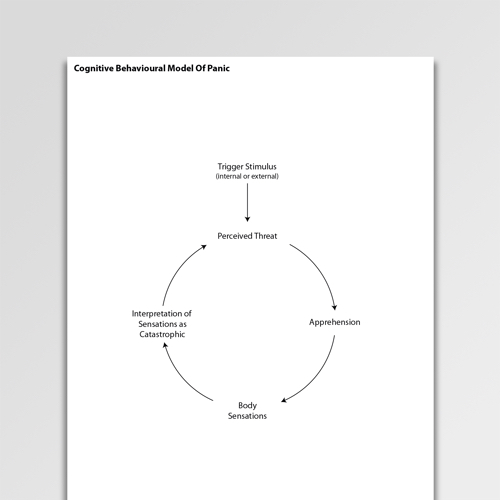 Source: psychologytools.com
Source: psychologytools.com
Cognitive behavioral therapy CBT is a form of psychological treatment that has been demonstrated to be effective for a range of problems including depression anxiety disorders alcohol and drug use problems marital problems eating disorders and severe mental illness. Clarks 1986 cognitive theory of panic disorder proposes that individuals who experience recurrent panic attacks do so because they have an enduring tendency to misinterpret benign bodily sensations as indications of an immediately impending physical or mental catastrophe. Same cognitive affective and behavioral responses associated with the origi-nal trauma. Panic attacks are characterized by increased heart rate. David Clark 1986 and Aaron Beck 1989 view panic attacks as a catastrophic misinterpretation of harmless bodily sensations.
 Source: semanticscholar.org
Source: semanticscholar.org
Rheumatic disease pain CBT that has multiple treatment components is effective. Patients with anxiety disorder tend to imagine the worst possible scenario and avoid situations. 461 are a necessary condition for the production of a panic attack. Psychologists have a long record of interest in issues relating to fear and anxiety. David Clark 1986 and Aaron Beck 1989 view panic attacks as a catastrophic misinterpretation of harmless bodily sensations.
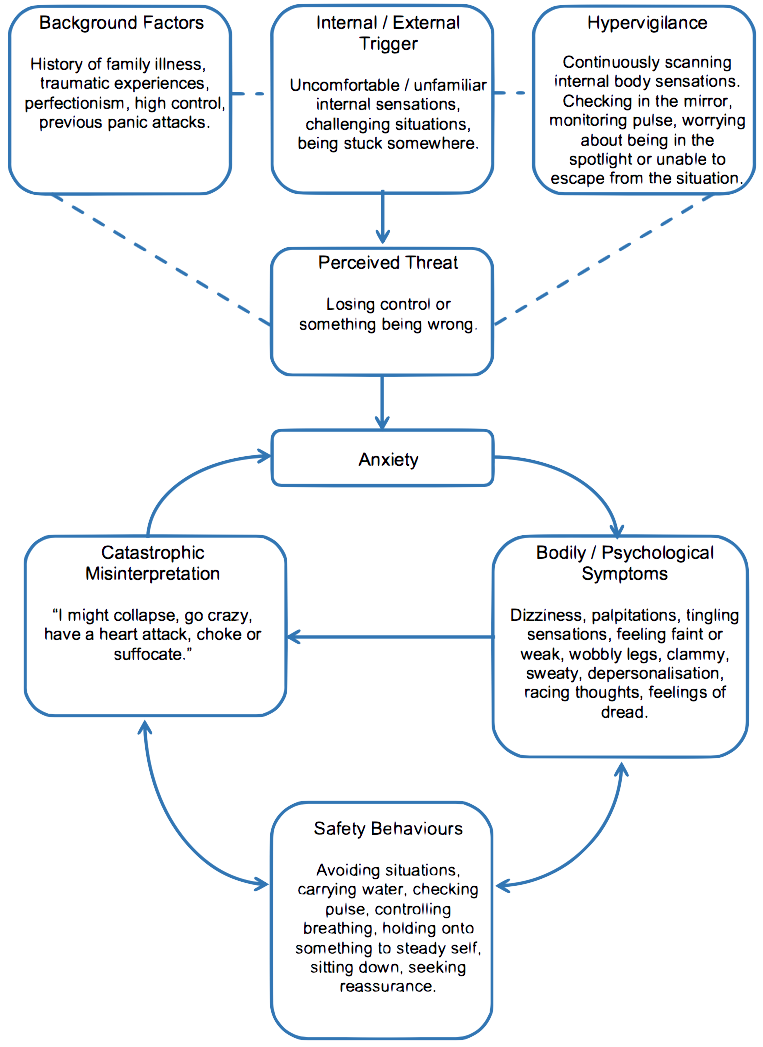 Source: thinkcbt.com
Source: thinkcbt.com
For example a patient notices an increase in his heart rate and thinks the increased heart race is a sign of a heart attack. The specific objectives were to study the efficacy of CBI in reducing symptom severity cognitions and panic-related behaviors among individuals with panic disorder. A logical extension of this was the development of cognitive models of panic disorder. Millions of people are affected by panic attacks. The alarming thought I am having a heart attack increases the fear.
 Source: researchgate.net
Source: researchgate.net
Rheumatic disease pain CBT that has multiple treatment components is effective. Cognitive Models of Panic Disorder. Given the limitations of cognitive-behavioral therapy for panic and agoraphobia therapists should consider extending exposure to the underlying causes and dynamics of panic disorder 51. A definition of panic disorder is that it involves recurrent unexpected panic attacks where the sufferer between attacks still lives in fear of another one happening. Another effective psychotherapyoften considered to be the most popular type of therapy for anxiety disorders is cognitive-behavioral therapy CBT.
 Source: scielo.br
Source: scielo.br
For example a patient notices an increase in his heart rate and thinks the increased heart race is a sign of a heart attack. CBT for panic disorder typically involves education about the nature and physiology of the panic response cognitive therapy techniques designed to modify catastrophic misinterpretations of panic symptoms and their consequences and graduated exposure to panic-related body sensations ie interoceptive exposure and avoided situations. The specific objectives were to study the efficacy of CBI in reducing symptom severity cognitions and panic-related behaviors among individuals with panic disorder. Clarks elegantly simple model of panic owes much to the ideas of Beck eg 1976 which are discussed in detail in Chapter 4. Rheumatic disease pain CBT that has multiple treatment components is effective.
 Source: quirurgica.com
Source: quirurgica.com
When properly implemented cognitive behavior therapy focuses on positive behavioral changes which will reinforce coping strategies ensuring success for client living with panic attacks. According to Clarks 1986 1996 model of panic catastrophic misinterpretations of certain bodily sensations 1986 p. Moreover compared to panicking patients panic-free patients had reduced their cognitive threat bias at post-treatment and follow-up to a significantly larger extent. Cognitive-behavioral treatments normalized this bias and Cognitive Behavior Therapy and Applied Relaxation were equally effective in this respect. Panic attacks are sudden episodes of intense fear or anxiety of a rapid escalation normally present somatic and cognitive symptoms such as palpitations sweating sudden tremor feeling of choking chest pain nausea and fear of dying or.
 Source: cogbtherapy.com
Source: cogbtherapy.com
In effect the individual fear structure is virtually stuck in a moment in time that has now passed but that has not been processed or digested in. Finally the clients are taught that small changes lead to life changes. According to Clarks 1986 1996 model of panic catastrophic misinterpretations of certain bodily sensations 1986 p. Clarks cognitive model of panic. Rheumatic disease pain CBT that has multiple treatment components is effective.
 Source: researchgate.net
Source: researchgate.net
According to Clarks 1986 1996 model of panic catastrophic misinterpretations of certain bodily sensations 1986 p. Eye movement desensitization and reprocessing EMDR therapy is. A logical extension of this was the development of cognitive models of panic disorder. Patients with anxiety disorder tend to imagine the worst possible scenario and avoid situations. Cognitive theory has explained anxiety as the tendency to overestimate the potential for danger.
 Source: rcpsych.ac.uk
Source: rcpsych.ac.uk
Same cognitive affective and behavioral responses associated with the origi-nal trauma. Likewise what might be a cognitive distortion that a person who has panic disorder experiences. Cognitive-behavioral treatments normalized this bias and Cognitive Behavior Therapy and Applied Relaxation were equally effective in this respect. Cognitive Models of Panic Disorder. Cognitive behavioral therapy CBT is a form of psychological treatment that has been demonstrated to be effective for a range of problems including depression anxiety disorders alcohol and drug use problems marital problems eating disorders and severe mental illness.

Clarks cognitive model of panic. Randomized clinical trials indicate that approximately two-thirds of children treated with CBT will be. According to Clarks 1986 1996 model of panic catastrophic misinterpretations of certain bodily sensations 1986 p. What is the cognitive behavioral theory of panic disorder. A definition of panic disorder is that it involves recurrent unexpected panic attacks where the sufferer between attacks still lives in fear of another one happening.
 Source: sciencedirect.com
Source: sciencedirect.com
Clarks 1986 cognitive theory of panic disorder proposes that individuals who experience recurrent panic attacks do so because they have an enduring tendency to misinterpret benign bodily sensations as indications of an immediately impending physical or mental catastrophe. Cognitive Models of Panic Disorder. According to what is called anxiety _____ theory people who develop panic disorder have heightened responsiveness to the presence of carbon dioxide in the blood. Clarks elegantly simple model of panic owes much to the ideas of Beck eg 1976 which are discussed in detail in Chapter 4. Cognitive-behavioral treatments normalized this bias and Cognitive Behavior Therapy and Applied Relaxation were equally effective in this respect.
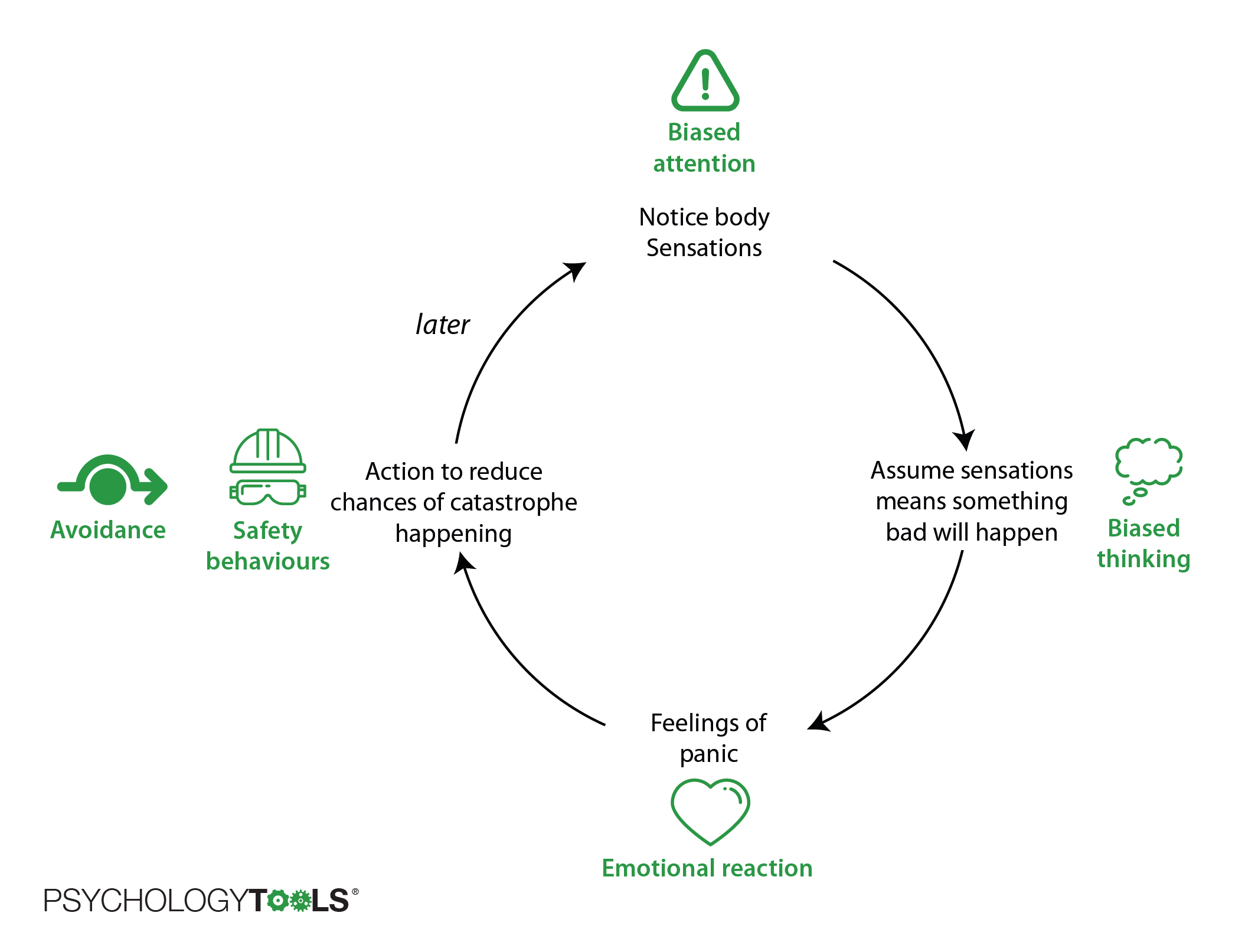 Source: psychologytools.com
Source: psychologytools.com
Panic attacks are characterized by increased heart rate. Sensitivity When individuals avoid places that cause panic attacks they. According to Clarks 1986 1996 model of panic catastrophic misinterpretations of certain bodily sensations 1986 p. Another effective psychotherapyoften considered to be the most popular type of therapy for anxiety disorders is cognitive-behavioral therapy CBT. Likewise what might be a cognitive distortion that a person who has panic disorder experiences.
 Source: aafp.org
Source: aafp.org
For example a patient notices an increase in his heart rate and thinks the increased heart race is a sign of a heart attack. The purpose of the current article is to provide an. Clarks 1986 cognitive theory of panic disorder proposes that individuals who experience recurrent panic attacks do so because they have an enduring tendency to misinterpret benign bodily sensations as indications of an immediately impending physical or mental catastrophe. Clarks cognitive model of panic. For example a patient notices an increase in his heart rate and thinks the increased heart race is a sign of a heart attack.
This site is an open community for users to share their favorite wallpapers on the internet, all images or pictures in this website are for personal wallpaper use only, it is stricly prohibited to use this wallpaper for commercial purposes, if you are the author and find this image is shared without your permission, please kindly raise a DMCA report to Us.
If you find this site helpful, please support us by sharing this posts to your favorite social media accounts like Facebook, Instagram and so on or you can also save this blog page with the title what is the cognitive behavioral theory of panic disorder by using Ctrl + D for devices a laptop with a Windows operating system or Command + D for laptops with an Apple operating system. If you use a smartphone, you can also use the drawer menu of the browser you are using. Whether it’s a Windows, Mac, iOS or Android operating system, you will still be able to bookmark this website.
